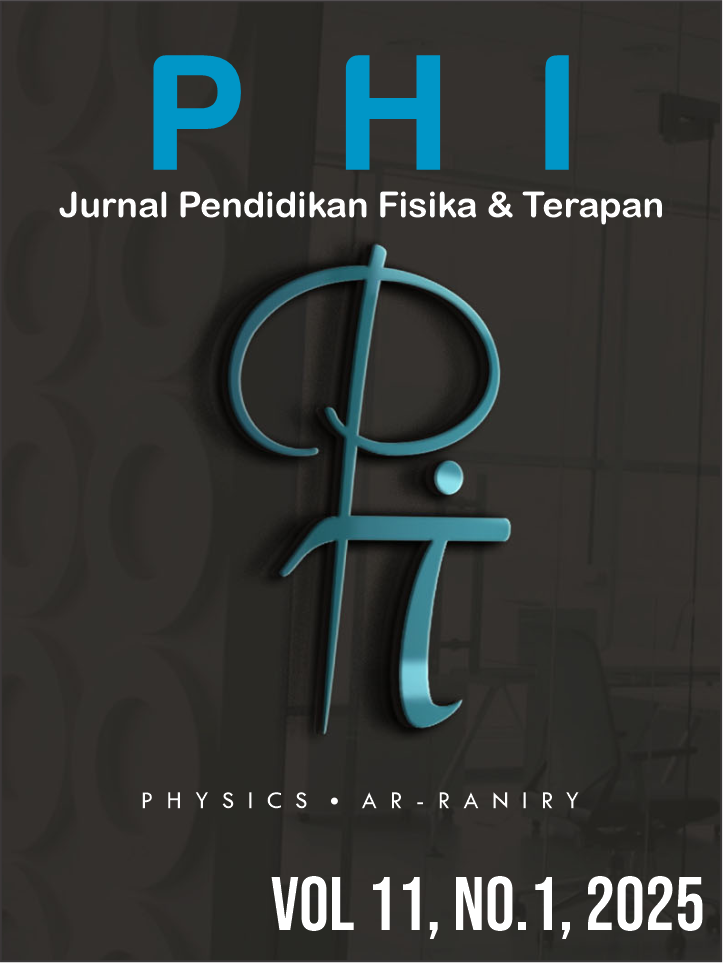Development of E-LKPD Assisted by the Flip Builder Application with a Discovery Learning Approach on Business and Energy Materials
DOI:
https://doi.org/10.22373/p-jpft.v11i1.25199Keywords:
E-LKPD, discovery learning, effort and energyAbstract
The learning process in general still uses books and conventional learning models that make students feel bored and bored. The objectives of the study were to: (1) determine the feasibility of E-LKPD, (2) find out the response of students to E-LKPD, (3) find out the improvement of student learning outcomes to E-LKPD based on discovery learning. The method used in the research is the research method of research and development (R & D) development with a 4-D model. The results showed that: (1) the feasibility of developing discovery learning-based E-LKPD assessed by media experts with a feasibility of 0.79 with the feasible category and material experts were in the feasibility of 0.89 with the very feasible category and teacher assessment with a feasibility of 0.94 with the very feasible category, (2) the response of students to the discovery learning-based E-LKPD was 0.99 with the very interesting category, (3) E-LKPD based on discovery learning is stated to be able to improve student learning outcomes by obtaining an N-Gain Score of 0.78 with a high category and a percentage of 77.61 in the "Very Effective" category. It can be concluded that discovery learning-based E-LKPD can be used in the learning process.References
Ariani, D. 2020. Pengembangan Lembar Kerja Peserta Didik (Lkpd) Berbasis Discovery Learning Pada Materi Kalor Di Smp.
Cintia, N. I., Kristin, F., & Anugrahaeni, I. 2018. Penerapan Model Pembelajaran Discovery Learning untuk Meningkatkan Kemampuan Berpikir Kreatif dan Hasil Belajar Siswa. Perspektif Ilmu Pendidikan, 32(1), 69-77.
Ginting, F. W., Sakdiah, H., Rose, J., & Febrianty, N. 2023. Pengembangan Four-Tier Diagnostic Test Untuk Menganalisis Kemampuan Konsepsi Siswa Pada Fluida Statis. Jurnal Dedikasi Pendidikan, 7(1), 51-60. https://doi.org/10.30601/dedikasi.v7i1.3442
Lestari, A., Hairida, & Lestari, I. 2021. Pengembangan Lembar Lembar Kerja Peserta Didik (LKPD) Berbasis Discocery Learning pada Materi Asam dan Basa. Jurnal Zarah, 9(2), 117-124.
Lubis, A., & Sukmawarti. 2022. Pengembangan Lkpd Berbasis Discovery Learning Pada Tema Panas Dan Perpindahannya Subtema Suhu Dan Kalor Kelas V Sekolah Dasar. Penelitian Pendidikan MIPA, 6(2), 1-7.
Maharani, P. A., Risdianto, E., & Setiawan, I. 2024. Pengembangan Media Pembelajaran Interaktif Berbantuan Google Sites untuk Meningkatkan Hasil Belajar Siswa pada Materi Momentum dan Impuls. Jurnal Penelitian Pembelajaran Fisika, 15(1), 31-42.
Maulana, I. 2020. Pengembangan E-Modul Flipbook Berbantuan Flip Pdf Professional Dengan Pendekatan Situation Based Learning (SBL) pada Pokok Bahasan Sistem Persamaan Linear Dua Variabel (SPLDV) Kelas VIII Di SMP Negeri 12 Bandar Lampung (Doctoral dissertation, UIN Raden Intan Lampung).
Putri, A., Roza, Y., & Maimunah, M. 2020. Development of learning tools with the discovery learning model to improve the critical thinking ability of mathematics. Journal of Educational Sciences, 83-92.
Rizki, M. P., Sakdiah, H., Ginting, F. W., Zahara, S. R., Muliani, & Damanik, B. P. P. 2023. Pengembangan Lembar Kerja Peserta Didik (Lkpd) Berbasis Guided Discovery Learning Menggunakan Simulasi Physics Education Technology (Phet) Pada Materi Listrik Dinamis. Relativitas: Jurnal Riset Inovasi Pembelajaran Fisika, 6(1), 31. https://doi.org/10.29103/relativitas.v6i1.7305
Rosalina, A. M. 2017. Pengembangan Bahan Ajar Biologi Berbasis STEM (Science Technology Engineering And Mathematics) Pada Pokok Bahasan Bioteknologi Kelas XII SMA (Sekolah Menengah Atas). Universitas Jember.
Sari, R. R., Ariani, T., & Lovisia, E. 2022. Pengembangan E-Modul Fisika Berbasis Contextual Teaching and Learning (CTL) Untuk Mengukur Hasil Belajar Fisika Materi Gerak Lurus Kelas X SMA Negeri 2 Lubuklinggau. 3(1), 42-60.
Ulfa, N. F. 2022. Pengembangan e-lkpd (elektronik–lembar kerja peserta didik) interaktif menggunakan google slide with pear deck dengan pendekatan kontruktivisme (Doctoral dissertation, UIN RADEN INTAN LAMPUNG).
Wudda, A. A., Hufri, H., Gusnedi, G., & Dewi, W. S. 2024. Validasi E-LKPD Interaktif Berbasis Model Pembelajaran Contextual Teaching and Learning pada Materi Hukum Termodinamika. Jurnal Pendidikan Tambusai, 8(1), 7543-7552.
Yanuarti, E. 2017. Pemikiran pendidikan ki. Hajar dewantara dan relevansinya dengan kurikulum 13. Jurnal Penelitian, 11(2), 237-265
Yunianto, T., Negara, H. S., & Suherman, S. 2019. Flip builder: Pengembangan pada Media Pembelajaran Matematika. Jurnal Pendidikan dan Pembelajaran Dasar, 6(2), 155-127
Zulfa, M., Muliani, Sakdiah, H., Idris, S., & Ginting, F. W. 2023. Development Of Powtoon-Based Audio-Visual Learning Media to Improve Students ’ Creative Thinking Ability on Straight-Motion Materials. Jurnal Eduscience (JES), 10(1), 8-18.
Downloads
Published
Issue
Section
License
Authors who publish with Jurnal Phi agree to the following terms:
- Authors retain copyright and grant the journal right of first publication with the work simultaneously licensed under a Creative Commons Attribution License (CC BY 4.0) that allows others to share the work with an acknowledgment of the work's authorship and initial publication in this journal.
- Authors are able to enter into separate, additional contractual arrangements for the non-exclusive distribution of the journal's published version of the work (e.g., post it to an institutional repository or publish it in a book), with an acknowledgment of its initial publication in this journal.
- Authors are permitted and encouraged to post their work online (e.g., in institutional repositories or on their website) prior to and during the submission process, as it can lead to productive exchanges, as well as earlier and greater citation of published work (See The Effect of Open Access).

















